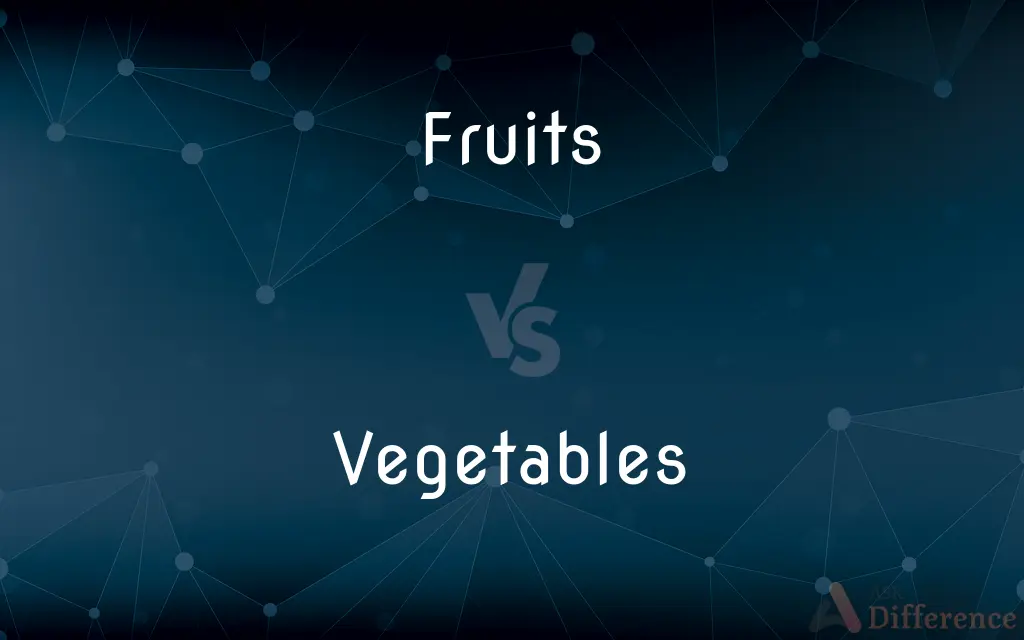Fruits vs. Vegetables — What's the Difference?
By Tayyaba Rehman & Fiza Rafique — Published on September 28, 2023
Fruits are the mature ovaries of flowering plants, often sweet or sour in taste and typically consumed as a natural snack. Vegetables are edible parts of plants such as leaves, stems, and roots, usually consumed in savory dishes.

Difference Between Fruits and Vegetables
Table of Contents
ADVERTISEMENT
Key Differences
Fruits are produced by flowering plants and generally contain seeds; they are often sweet or sour in taste and are consumed in various forms including fresh, dried, and juiced. Vegetables, on the other hand, can come from various parts of a plant including the leaves, roots, and stems, and are usually more savory or bitter than fruits.
When you eat an apple, you're eating the mature ovary of the apple tree, which classifies it as a fruit. When you eat spinach, you're eating the leaves of the plant, categorizing it as a vegetable. Fruits are primarily consumed for their natural sugars and flavors, whereas vegetables are often valued for their nutritional content including vitamins and fiber.
From a culinary perspective, fruits are generally used in desserts, smoothies, or eaten on their own. Vegetables are typically part of main or side dishes and are often cooked, although they can be consumed raw. Despite these general rules, there are some exceptions like tomatoes and bell peppers, which are fruits but often treated as vegetables in cooking.
In summary, fruits are usually sweet or sour and consumed for their natural taste and sugars. Vegetables can be derived from various parts of a plant and are more likely to be included in savory or salty dishes. Both are vital components of a balanced diet but serve different culinary and nutritional roles.
Comparison Chart
Part of Plant
Mature ovary
Leaves, stems, roots
ADVERTISEMENT
Taste
Usually sweet or sour
Usually savory or bitter
Culinary Usage
Desserts, snacks
Main dishes, sides
Nutritional Focus
Natural sugars, vitamins
Fiber, vitamins, minerals
Seed Presence
Usually contains seeds
Rarely contains seeds
Compare with Definitions
Fruits
Mature Ovary: "Fruits are the mature ovaries of flowering plants."
Apples are fruits that come from the mature ovary of apple trees.
Vegetables
Edible Plant Parts: "Vegetables are edible parts of plants."
Carrots are vegetables that are actually the root of the plant.
Fruits
Seed-bearing: "Fruits usually contain seeds."
Watermelons are fruits that contain many seeds.
Vegetables
Non-Seed Bearing: "Vegetables usually don’t contain seeds."
Lettuce is a vegetable that doesn't contain seeds.
Fruits
Natural Snacks: "Fruits are often consumed fresh as natural snacks."
I like to eat fruits like bananas and oranges as snacks.
Vegetables
Nutrient-Rich: "Vegetables are rich in vitamins, minerals, and fiber."
Spinach is a nutrient-rich vegetable.
Fruits
Sweet or Sour: "Fruits are generally sweet or sour in taste."
Berries are fruits that are often sweet.
Vegetables
Main Dishes: "Vegetables are often cooked and served in main or side dishes."
I like to include a variety of vegetables in my stir-fry.
Fruits
Sugar Source: "Fruits are rich in natural sugars."
Grapes are fruits high in natural sugars.
Vegetables
Savory: "Vegetables are generally savory or bitter in taste."
Brussels sprouts are vegetables that some find bitter.
Fruits
The ripened ovary or ovaries of a seed-bearing plant, together with accessory parts, containing the seeds and occurring in a wide variety of forms.
Vegetables
A plant cultivated for its edible parts, such as the roots of the beet, the leaves of spinach, the flower buds of broccoli, or the fruit or seeds of certain species, as beans, corn, and squash.
Fruits
An edible, usually sweet and fleshy form of such a structure.
Vegetables
The edible part of such a plant.
Fruits
A part or an amount of such a plant product, served as food
Fruit for dessert.
Vegetables
A member of the vegetable kingdom, especially a green plant.
Fruits
The fertile, often spore-bearing structure of a plant that does not bear seeds.
Vegetables
Offensive Slang One who is severely impaired mentally and physically, as by brain injury or disease.
Fruits
A plant crop or product
The fruits of the earth.
Vegetables
Of, relating to, or derived from plants or a plant
Vegetable dyes.
Fruits
Result; outcome
The fruit of their labor.
Vegetables
Made from or with edible plants or plant parts
Vegetable lasagna.
Fruits
Offspring; progeny.
Vegetables
Growing or reproducing like a plant.
Fruits
A fruity aroma or flavor in a wine.
Vegetables
Plural of vegetable
Fruits
Offensive Slang Used as a disparaging term for a gay man.
Fruits
To produce or cause to produce fruit.
Fruits
Plural of fruit
Common Curiosities
What are Vegetables?
Vegetables are edible parts of plants, usually consumed in savory dishes.
What are Fruits?
Fruits are the mature ovaries of flowering plants, often sweet or sour in taste.
Are Fruits Sweet?
Fruits are generally sweet or sour, rich in natural sugars.
Which are Healthier, Fruits or Vegetables?
Both are healthy but offer different nutrients; fruits are rich in natural sugars and vitamins, while vegetables offer fiber, vitamins, and minerals.
Do Fruits Have Seeds?
Most fruits contain seeds.
How are Vegetables Eaten?
Vegetables are commonly cooked but can also be eaten raw.
Are Vegetables Savory?
Vegetables are usually more savory or bitter in taste.
Do Vegetables Have Seeds?
Vegetables rarely contain seeds.
Can Fruits Be Cooked?
While commonly eaten fresh, some fruits like apples and pears can be cooked.
Can Fruits Be Savory?
While usually sweet or sour, some fruits like avocados are savory.
How are Fruits Eaten?
Fruits are often consumed fresh, dried, or juiced.
Why Are Tomatoes Fruits?
Tomatoes are fruits because they contain seeds and come from the flowering part of the plant.
Can Vegetables Be Sweet?
While generally savory or bitter, some vegetables like sweet potatoes can be sweet.
Can Vegetables Be Eaten Raw?
Many vegetables can be eaten raw, like carrots and lettuce.
Why Are Bell Peppers Considered Fruits?
Like tomatoes, bell peppers are fruits because they contain seeds and develop from the flower of the plant.
Share Your Discovery

Previous Comparison
Artisanal vs. Industrial
Next Comparison
Tax vs. CessAuthor Spotlight
Written by
Tayyaba RehmanTayyaba Rehman is a distinguished writer, currently serving as a primary contributor to askdifference.com. As a researcher in semantics and etymology, Tayyaba's passion for the complexity of languages and their distinctions has found a perfect home on the platform. Tayyaba delves into the intricacies of language, distinguishing between commonly confused words and phrases, thereby providing clarity for readers worldwide.
Co-written by
Fiza RafiqueFiza Rafique is a skilled content writer at AskDifference.com, where she meticulously refines and enhances written pieces. Drawing from her vast editorial expertise, Fiza ensures clarity, accuracy, and precision in every article. Passionate about language, she continually seeks to elevate the quality of content for readers worldwide.
















































